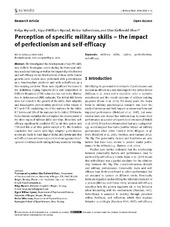Perception of specific military skills – the impact of perfectionism and self-efficacy
Peer reviewed, Journal article
Published version

Åpne
Permanent lenke
https://hdl.handle.net/1956/19354Utgivelsesdato
2018-08-04Metadata
Vis full innførselSamlinger
Originalversjon
https://doi.org/10.2478/jms-2018-0002Sammendrag
We investigated the development of specific military skills in Norwegian cadets during the three-year military academy training as well as the impact of perfectionism and self-efficacy on the development of these skills. Latent growth-curve models were performed with perfectionism as a time-invariant predictor and with self-efficacy as a time-varying predictor. There were significant increases in the Individual Coping Capacity (ICC) and Cooperation in Difficult Situations (CDS) subscales but not in the Motivation to Achievement (MA) subscale. The initial skill levels were not related to the growth of the skills. Both adaptive and maladaptive perfectionism predicted initial values of ICC and CDS, explaining 5% of the variance in the initial ICC levels and 12% of the variance in the initial CDS levels. Perfectionism variables did not explain the development of the three types of military skills over time. Moreover, self-efficacy significantly predicted ICC at all time points and CDS and MA at all time points except at T3. We therefore concluded that cadets with high adaptive perfectionism scores are likely to have higher initial skill levels and that self-efficacious cadets are expected to show a greater development of military skills during military academy training.
